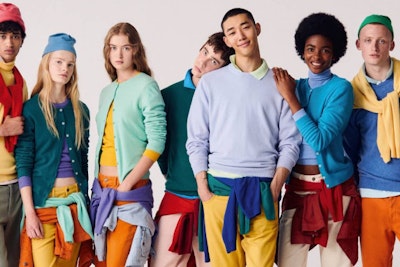Benetton
Colorful, modern fashion for men, women, and kids

Benetton's Sustainability Rating
Acceptable
Raw Materials
Benetton is a member of the Better Cotton Initiative and makes a small proportion of its garments with lowest emissions materials, including recycled wool and recycled cotton. However, it's still reliant on high emissions materials, such as conventional cotton, polyester, nylon, virgin wool, viscose, and elastane. It plans to reduce its reliance on these materials with a goal to have all the cotton in its collections be 'sustainable' by 2025. It has reported on progress towards this goal within the last year, but does not appear to be on track.
Energy Use & Production
Benetton utilizes renewable energy in a portion of its production and direct operations. Benetton sources and manufactures its materials globally, which is standard practice in the fashion industry. It's working to reduce the span of its operations by closing the distance between factories and distribution, but hasn't reported specifics or progress on this initiative.
Packaging & Distribution
Benetton has made some efforts to reduce plastic in its packaging. Its eco-friendly packaging materials include fsc certified material and biodegradable polybags.
Repair & Care
Benetton offers repair advice and tips, but doesn't offer a warranty. It gives detailed care instructions to help extend garment lifespan, though not all instructions are eco-friendly.
Take Back Programs
Benetton doesn't offer a take back program to help keep its products out of landfill. Benetton shares details on how successful this program is at diverting items from landfills.
Slow Fashion
Benetton offers a core collection alongside additional items. It has frequent new releases and restocks.
Marketing
Commons is still evaluating this brand's marketing emails.
Transparency & Reporting
Benetton has a prominent sustainability page on both its customer and corporate sites, which contain information on materials, packaging, labor practices, supply chain partners, and emissions measurement. It's unclear how often this page or information is kept up to date. Benetton Group releases annual sustainability reports containing information on materials, packaging, energy use, circularity, and labor practices. Its latest annual report is from 2023.
Emissions Tracking
Benetton has measured its emissions, and has verified them with a third party. It identifies its top driver of emissions by including detailed breakdowns. It reports emissions on an organization level, and in its 2023 update its estimated total was 583,650 t CO2e.
Targets & Offsets
Benetton has SBTi-approved emissions reduction targets for the medium-term. It makes updates on these targets difficult to find, but appears to be on track for some of the targets. Commons couldn't find verification that it offsets any emissions.
Supply Chain & Labor
Benetton publishes full information on Open Supply Hub about its supply chain partners across its upstream production. It has a supplier code of conduct, which includes provisions banning forced labor, allowing collective bargaining, and restricting subcontracting.
Benetton is rated Acceptable because it has started to improve its products and processes, but still has room to improve.
The brand publicly reports on its emissions impact and has SBTi-approved emissions reduction targets. It has goals to improve its materials mix. However, Benetton is still reliant on high emissions, fossil-fuel based synthetic materials and it frequently releases new products. It doesn't appear to be on track for many of its textile sustainability and emission-reduction goals, and it makes clear progress reporting hard to find.
Our ratings are based on a scale from 1 (bad) to 5 (best). How we rate →
https://us.benetton.com/inside/article_recycled-polyester.html
https://us.benetton.com/l/sustainability.html
https://www.benettongroup.com/site/assets/files/7902/eng-2023-bilancio_integrato_benetton_group_01.pdf#page=50
https://us.benetton.com/inside/article_eco-friendly-packaging.html
https://us.benetton.com/b-care/b-care.html
https://us.benetton.com/l/sustainability.html https://www.benettongroup.com/en/sustainability/
https://www.benettongroup.com/en/sustainability/nature/combating-climate-change/science-based-target-initiative/
https://us.benetton.com/mini-skirt-in-imitation-leather-black-4IVRD004P_100.html
https://www.benettongroup.com/site/assets/files/1134/guidelines_benetton_07_03_22_pag__doppia.pdf
Get Rewards
Earn for sustainable purchases
Commons rewards you for sustainable purchases from all our Top Rated brands, plus thousands of everyday purchases — from thrift stores to public transit.
Learn more about rewards ->








